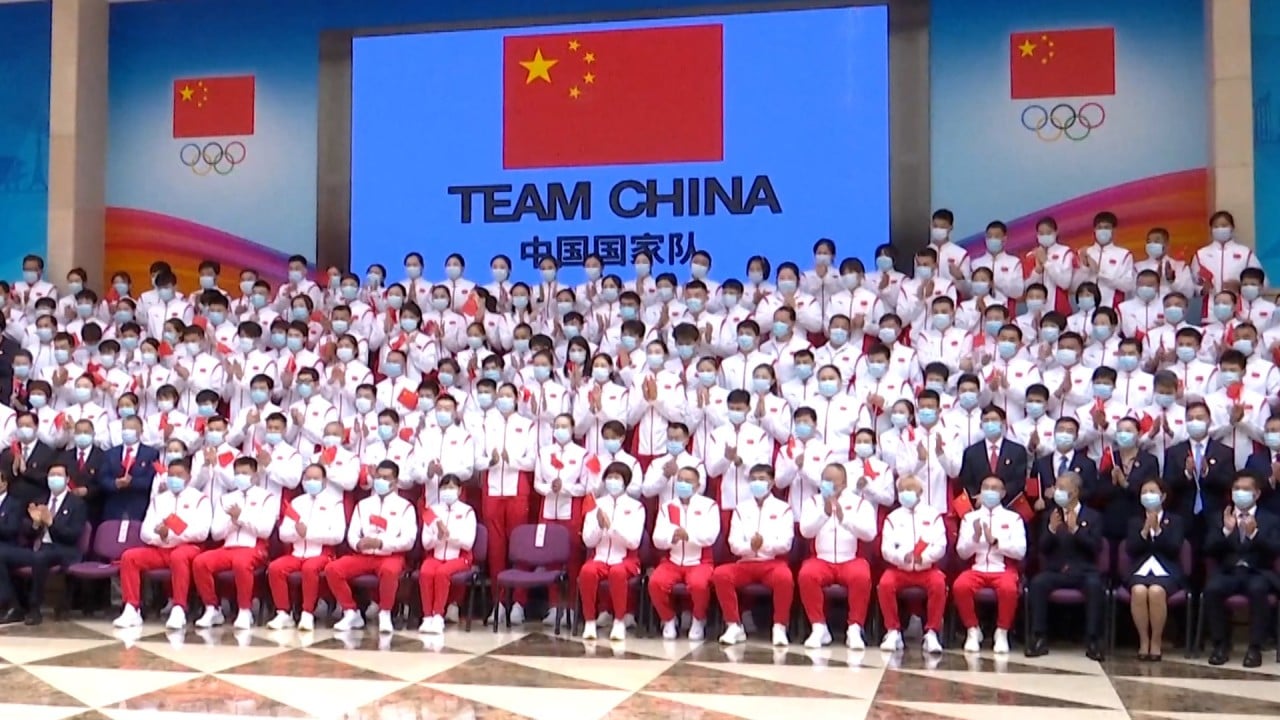
China has big dreams for Tokyo Olympics, but it’s not all about the medals
- The Chinese delegation will be hoping to improve its tally from previous Games but the country’s focus has broadened in recent years
- Fans in China are just as likely to celebrate their heroes’ sporting spirit, regardless of their success in the various events

01:32
China’s Tokyo Olympics delegation will be nation’s biggest yet for an international sporting event
Guo Zhongwen, head of the 777-strong Olympics delegation, said in Beijing on Wednesday the athletes should take up the responsibility to “fight for the country” at the Games, as a key part of China’s effort to become a strong sporting nation.
China’s medal haul at the 2016 Rio Olympics was disappointing, falling behind the US and Britain in the gold medal tally, and earning 70 medals in total after the US with 121.
By comparison, the 2008 Summer Games Olympics hosted by Beijing – intended as a triumphant showcase of China’s growing economic might – saw Chinese athletes take the most gold, with 51 medals over the US at 36, and come a close second in the overall medals table, with 100 compared to their American rivals at 110.
China’s rising nationalism may put a bigger spotlight on its athletes’ performance in Tokyo, particularly after the swelling of national pride which marked the July 1 celebrations of the Communist Party’s centenary. They will also be under pressure because of the heated rivalry with the US, fuelled by calls for a diplomatic boycott of February’s Winter Olympics in Beijing over alleged human rights abuses.

But analysts say that, even as Chinese fans will be cheering on their athletes, the single-minded focus on Olympic gold has eased since the country’s show of athletic excellence in 2008. Recent years have seen a shift in policy towards building China’s domestic sports industry and the development of mass participation.
The State Council has set targets for more than 45 per cent of the population to engage in regular exercise by 2035 and for China to become a “modern leading sports socialist country” by 2050.
Zhouxiang Lu, an expert in nationalism and sports history at Maynooth University in Ireland, said perspectives on the importance of Olympic gold had shifted in China, since the country’s earliest dream, articulated by a group of Tianjin students in 1908, to simply participate in the Games – something it was not able to do regularly until the early 1980s – and then host an Olympics and win gold medals.
“That Olympic dream was finally achieved at the Beijing Olympics and it became a starting point for perspectives to shift,” he said. “Gold medals are important and people still hope that Chinese athletes can earn gold medals, but in comparison to 10 or 15 years ago, everyone’s mentality has changed and the understanding of gold medals has changed.”
China table tennis boss says Olympic Covid rules ‘extremely difficult’
Lu said that during the 1980s and 1990s sport was seen as the only setting for China to gain national confidence by winning gold medals against athletes from developed countries.
“But now, there are so many areas for China to derive its national confidence, not just from sports. China’s technology, development, its containment of Covid-19 have exceeded that of developed countries in many areas, which has given people a sense of respect and confidence,” he said.
“Rather than just focusing on athletes as gaining glory for the country and carrying the flag into competition, there is more of a focus on their personalities and how they are as individuals,” Lu said. “It is a more multifaceted view of athletes, not just about them bringing glory to the country.”
Chinese athletes who have shot to fame in recent years have not only been gold medal winners, but also notable personalities – such as swimmer Fu Yuanhui, who won bronze in the 100m backstroke at the Rio Games in 2016, but captured hearts with her colourful interviews and facial expressions.
How much will a lack of tourists at the Tokyo Olympics cost Japan?
Another fan favourite is high jumper Zhang Guowei, who failed to bring home any medals from Rio or the 2012 London Olympics, but has delighted viewers with his over-the-top dance moves at competitions.
But Chinese audiences will still be eagerly watching to see how their athletes perform in Tokyo, particularly in sports where China has had a traditional advantage such as table tennis, badminton, diving, weightlifting, gymnastics and shooting.
Although there have already been disappointments – the Chinese men’s basketball team failed to qualify for the Olympics for the first time in 37 years and swimmer Sun Yang will miss the Games because of a doping ban – many will be watching to see if the women’s volleyball team can retain its title, as well as keenly watching China’s performances in three-player basketball and football.
Li Zhi, a professor with Fuzhou University’s law school and a legal adviser to the China Olympic Committee’s preparation office, said he hoped China would perform well in sports it has historically done well in, and achieve breakthroughs in swimming as well as track and field events.
“For China, competing for first place and national fitness are equally important,” he said. “On the one hand, sports are inherently competitive and reflect a group spirit, so if you do not try to win, then naturally the attractiveness of sports will decrease.
“At the same time, national fitness has been an important task for our country in recent years, and is a significant part of China becoming a sports power.”



